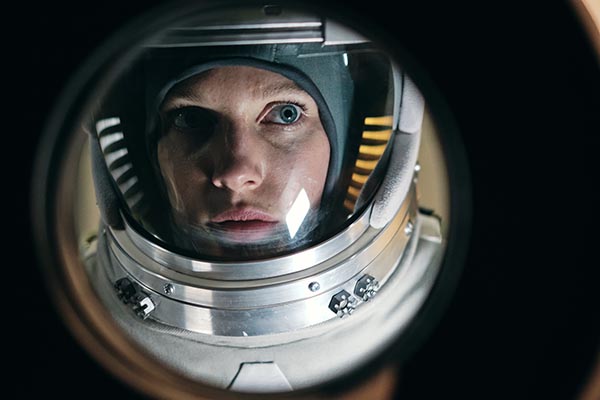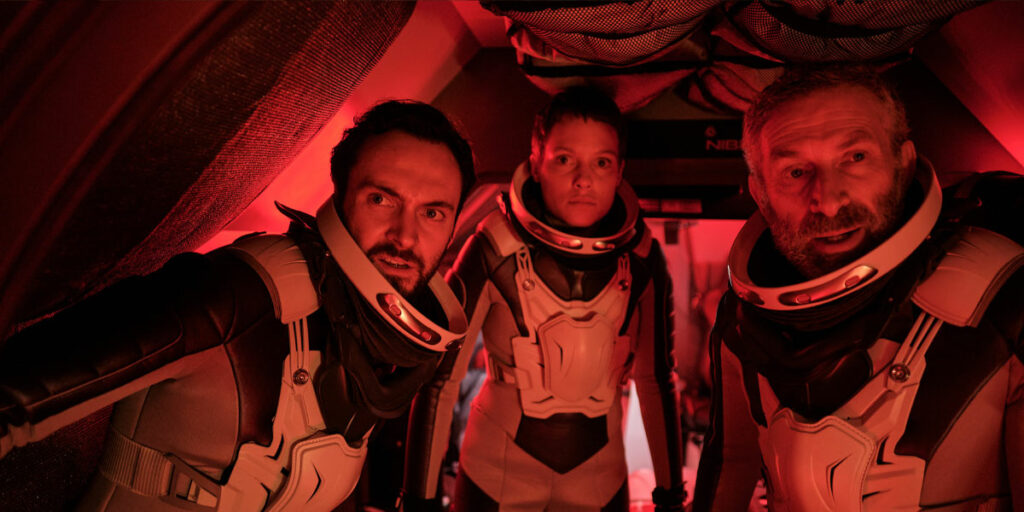Rubikon sparks up exciting ideas about morality and mortality amidst a probable “suicide mission” but falters as it transgresses.
There are a lot of Sci-Fi pictures that deal with the calamities, or adaptations, of climate change occurring around the world. Of course, most people know about Christopher Nolan’s Interstellar, but that isn’t the first example that comes to mind. The ones that come to mind first are two films that complement each other perfectly (both including small robot companions), even though in tone they are pretty different from each other, as one is dreary, and the other is a little bit more lighthearted: Douglas Trumbull’s Silent Running and Andrew Stanton’s WALL-E. Even when released decades apart, both talked about the dangers of the planet’s contamination and how everyone retreated to space because there wasn’t any option left. The two films show the different reflections on hope and despair; of course, Silent Running took a darker tone towards this examination. Now making its way onto the vast list of Sci-Fi projects that tackle the climate crisis is Rubikon.
The film looks quite well compared to other low-budgeted features but suffers from a lack of exploration in its concepts about morality, abandonment, and loneliness, among others. Rubikon begins with a brief written explanation of the state of the world. It’s set in the year 2056, where a toxic cloud caused by pollution has swallowed the Earth whole, killing thousands upon millions of people in the process as the days go by. Who controls the world now that it’s a ‘dog eat dog’ one? Giant corporations. Since the world’s nations have dissolved completely, all the power is now in the hands of the extremely wealthy enterprises. The people who have money in their deep pockets have retreated to biodomes crafted by these corporations, while the rest of the population starves and chokes to death because of the lack of resources. Over in space, one company is still searching for different possibilities to save humanity. Among the crew that we meet up in the stars are Hannah (Julia Franz Richter), Gavin (George Blagden), and Dimitri (Mark Ivanir).
These three space cadets are weighing the fake of what may possibly be the planet’s last survivors – three hundred of them, to be exact. That’s where the film’s interesting facets come to play. Rubikon asks whether these three crewmembers risk their own lives with a potential “suicide mission” to save the last people on Earth or if they should ignore them and survive cleanly within the station. Each of these three characters has different perspectives and morals, adding layers to the story being told. One of them is willing to risk their lives, but the other two are still debating whether it is actually worth it to save them. They do technically have a responsibility to protect the people, but at what cost? Their mission can go sideways, and their effort will be lost along with the stars. Between themselves and the survivors, the characters are pulling each other’s strings, so they lean onto the perspective and ethics of one another.

The trio of characters debate and confront each other for hours upon hours, but the director adds little moments of “joy” and affection so that it doesn’t feel one-note or monotonous. However, even with those moments, Rubikon manages to always feel slightly off for some particular reasons. And I think that reason is that it doesn’t successfully explore these characters’ mindsets and ethical frustrations, or at least present them in a more engaging fashion. Since the film is primarily about people sitting and talking about their opinions on the matter (the salvation of humanity, risking their lives, what will happen to them if they are not rescued, etc), the film might develop a sensation of repetition and uninterest. That might not have happened if one had developed its concepts properly, but unfortunately, in Rubikon, this happens to a damaging degree, even if they are interesting at first sight. Moreover, some of the narrative choices during the latter act of the movie are questionable because it seems quite forced rather than smoothly put together. This also tends to happen within the moments of high stakes and moments of tension.
Of course, there are questions about facing one’s own mortality, juxtaposing with the narrative of potentially sacrificing yourself for “nothing”. All of that is interesting, yet it doesn’t have the presentation to back it up. Overall, it leaves much to be desired. At least, what it lacks in thematic heft, it has in overall production value. It looks great for a low-budget Sci-Fi feature, from the production design to the art decoration. It’s an exciting look and aesthetic, that’s for sure, but it contains a claustrophobic atmosphere that helps Rubikon become more palpable to the eye – enhancing its viewing experience in the long run. There are a lot of elements to analyze and reflect on in Rubikon. One might even argue that the conversation after watching the film is worth more than the price of admission. Having that conversation about what you would have done in that situation is probably more entertaining than the film itself.
But it at least sparks conversation topics, unlike other Sci-Fi pictures that have roamed around through the years, even in 2022. The problem with Rubikon, in the end, is that it never finds a way to display these engaging and daring elements on the screen. Because, on paper, this could have stood next to Silent Running and other features that tackle some familiar topics. Albeit, once you see it, there’s this need for more because it doesn’t add the right amount of heft to its concepts. On the other hand, it contains good performances by its leading trio, and the aesthetics are top-notch. Even the CGI isn’t too bad for its low budget. Albeit, in Rubikon, that isn’t the case; it looks crisp and clear. The focus then needed to shift onto the screenplay. The writer had to take their time and ensure that it contained some fascinating storytelling paths. However, as mentioned, it falters as it transgresses – feeling forced through its moments of high tension.
Rubikon opened in US theaters and on VOD on July 1, 2022.

